BLOG
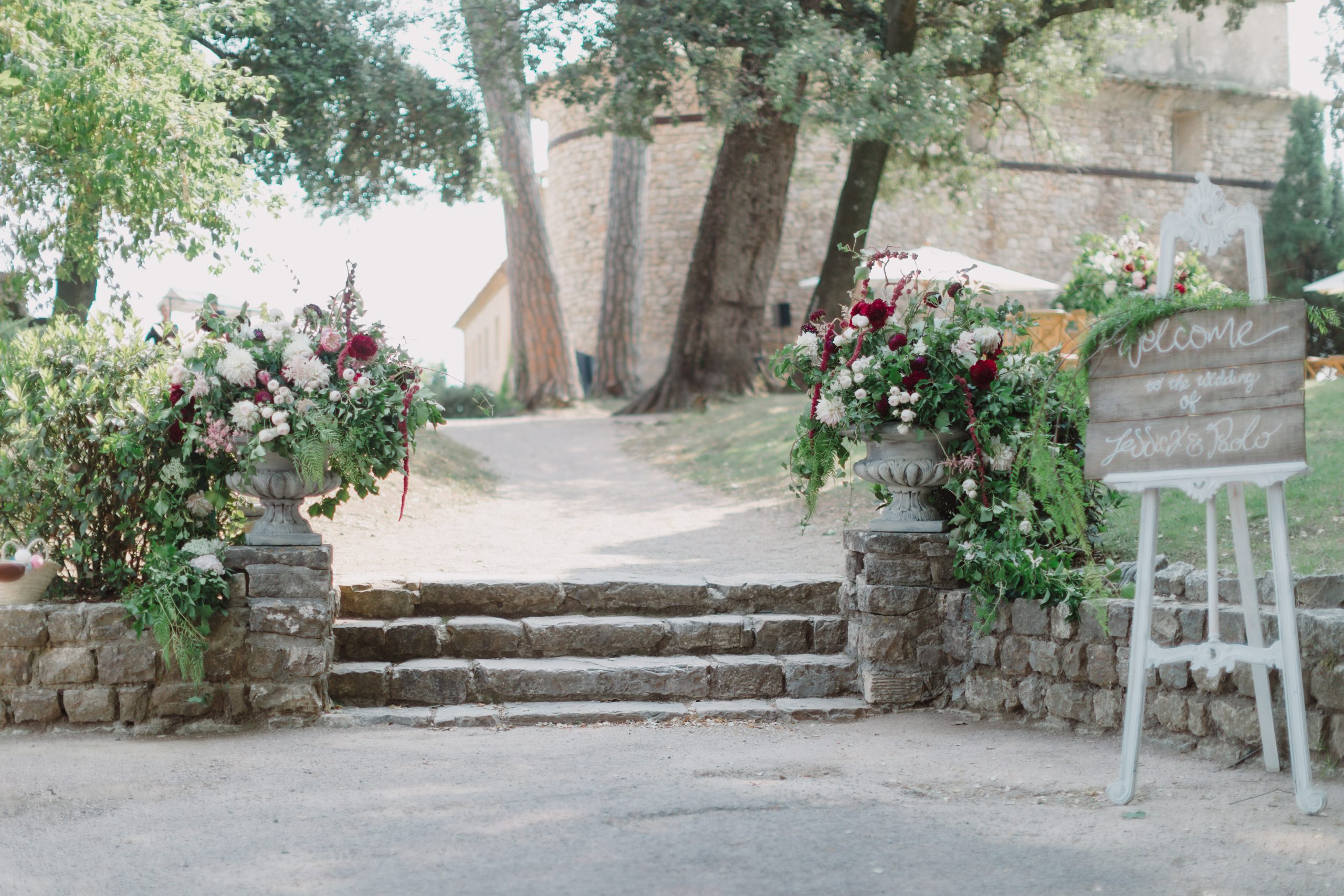
PLUNGE INTO THE WORLD OF EVENT FLORAL DECORATION THROUGH OUR REPORTS AND INSPIRATIONS. FOLLOW OUR EXPERTISE AND PASSION ON OUR BLOG!
La Serre de l'Art Qui Pousse, a place for floral creation
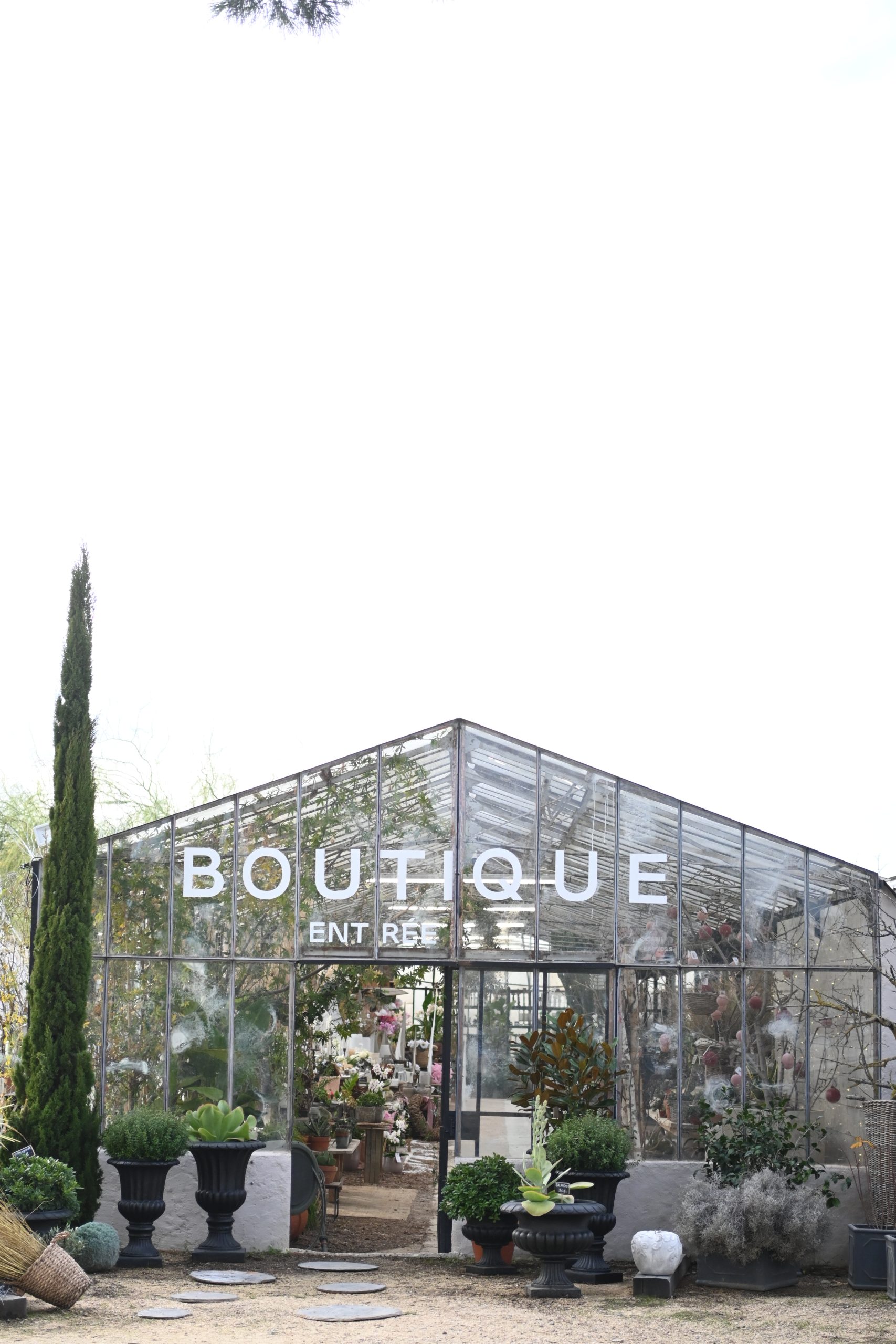
Ideally located and easily accessible, 12 kilometers from Toulon and 50 from Marseille, L'Art Qui Pousse's greenhouse workshop is an atypical and unique venue dedicated to the creation of wedding arrangements, decorations and bouquets.
Built in the 60s in the center of what would later become the Ollioules agricultural hub, the greenhouse was initially designed for the production of flowers such as Cyclamens, Azaleas and Cinereas. Over the years, it has also been used to produce exceptional rock garden plants. It was in January 2022 that L'Art Qui Pousse set up shop in this atypical and endearing location. It's a place steeped in the history of the plant world, which explains why it has such a special atmosphere, combining creativity and productivity to perfection. Situated in the Var department, halfway between Sanary/mer and Ollioules, at the foot of the hills and just a stone's throw from the sea, it's a formidable source of inspiration for our teams, but also an ideal location for events and weddings from Provence and the Vaucluse to the Côte d'Azur, Monaco and the Italian border.
Interior and exterior renovation work was necessary and was carried out to adapt the premises to our florist activity.
This began with the installation of a cold room to store our raw material, flowers. This was followed by the installation of a florist's workshop with sufficient space and the tools needed to work with flowers, prepare them and make the most beautiful bouquets, arrangements and decorations of all sizes.
The site now boasts a workshop dedicated to the creation of large-scale decors such as arches, chouppas and table plans, all of which are imagined, designed and made to measure on our premises by our teams.
Thanks to the greenhouse's surface area, we've been able to create a showroom where we can display and test different compositions, choose accessories such as photophores, candles, vases and candlesticks, and adapt our style to your every whim.
Since December 2022, L'Art Qui Pousse has also been a flower store, offering fresh and dried flowers, bouquets and floral arrangements.
This atypical venue has been designed to welcome professionals and future brides and grooms in an ideal setting for the projection and preparation of your wedding or event. Don't hesitate to contact us to arrange an appointment.
SPRING WORKSHOP
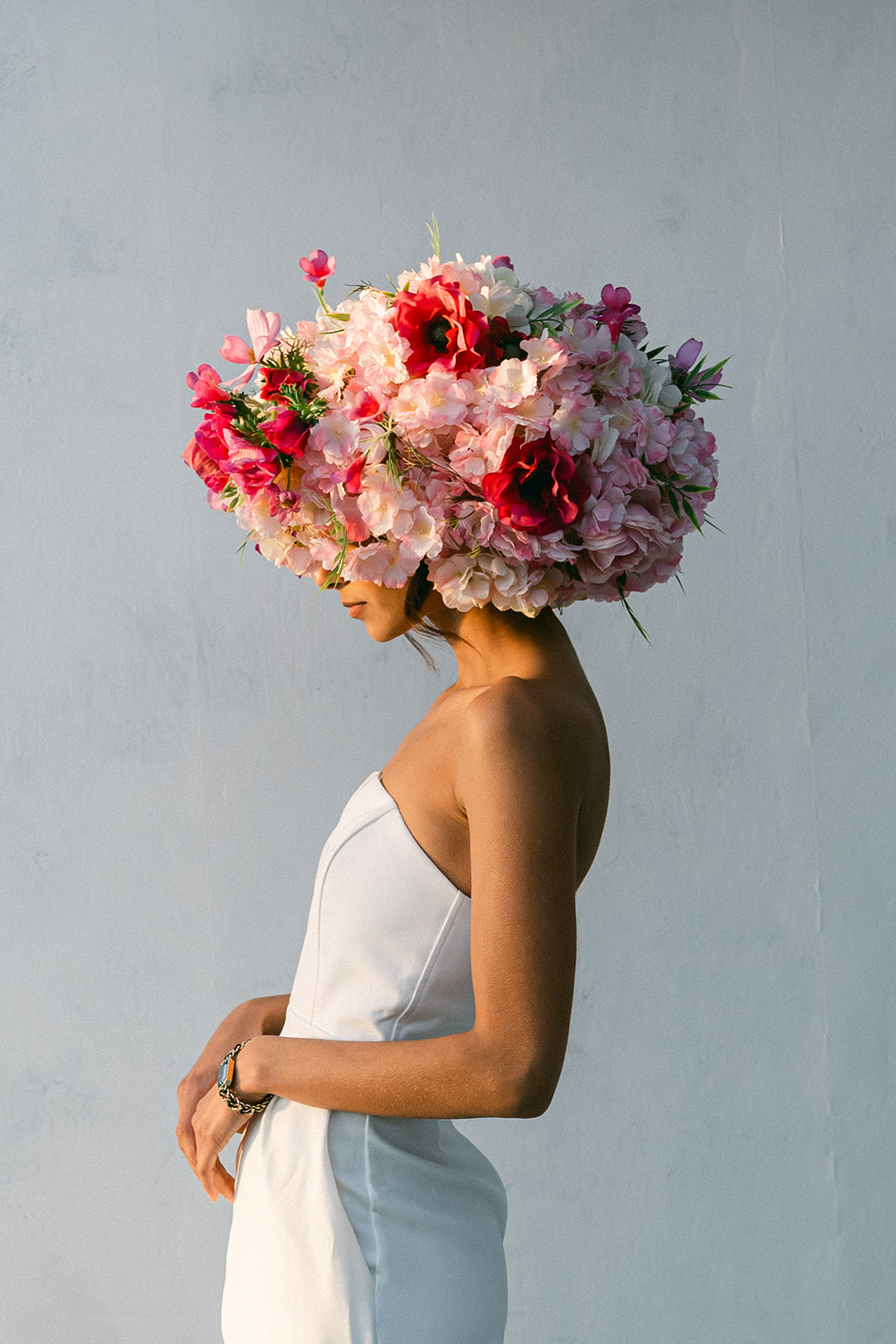
This workshop was devised in the L'Art qui Pousse workshop in Ollioules, in the Var region of France.
In the heart of a 1,000 m² greenhouse entirely dedicated to floral creation and events, our team wanted to highlight the arrival of Spring.
The aim was to celebrate Spring with a range of styles and complete decorative atmospheres, combining aesthetics, nature and elegance. This project was driven by the talent of photographer Christophe Serrano and Nadia Vaisse.
Virginie Sellem, scenographer, designed three distinct ambiances, each with a strong identity:
Natural elegance: a sober, chic décor combining raw wood, hand-crafted crockery, terracotta pottery and floral arrangements in a terracotta atmosphere.
The art of the garden: a lively, flowery setting in fresh colours for a friendly, springtime atmosphere.
A floral chandelier: a more ethereal décor, punctuated by colourful hanging flowers that add an original, contemporary touch.
Each world has been thought through down to the smallest detail. From the pottery to the candles, everything has been carefully chosen to create a coherent, joyful and refined atmosphere, in perfect harmony with the spirit of spring.
REPORT CAPITAL M6
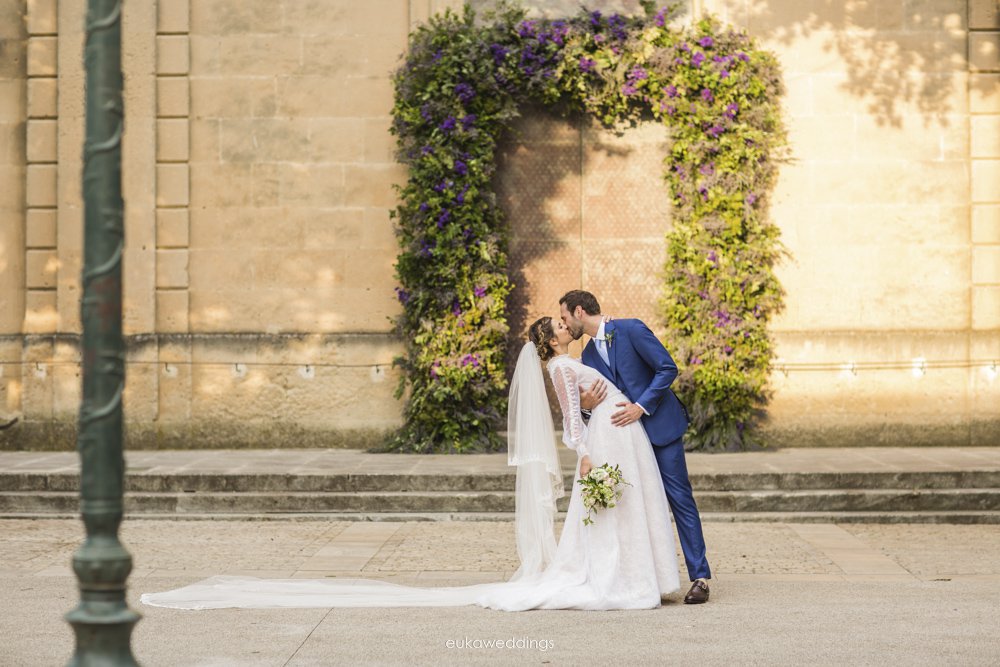
When the Dites moi Oui wedding planner agency in Marseille contacted me to tell me about a Brazilian couple who wanted to get married in Provence, followed by the Zone Interdite TV show on M6, I was immediately seduced. A wedding in the colors of Provence in a grandiose setting leaves plenty of room for inspiration and possibilities. Welcome to the Domaine de Manville (Maussane in the Luberon). This was without counting on the wonderful encounter between Renatta Chapmann, a floral scenographer based in Sao Polo, Brazil, and Joel Matsuoka, a florist designer also based in Sao Paulo. Together, they form an incredible team that has created some of the world's most luxurious weddings. Marina & Philippe, the bride and groom, wanted to surround themselves with their Brazilian wedding planning teams, hairdressers, makeup artists, seamstresses, EuKawedding photographer and filmaker. Orchestrated by Renatta in collaboration with Joèl, we followed a thread that blends Provence and the warmth of Brazil. An ideal blend for a wedding where emotion pierced the screens of M6 to the delight of viewers and the bride and groom.
REPORT CAPITAL M6
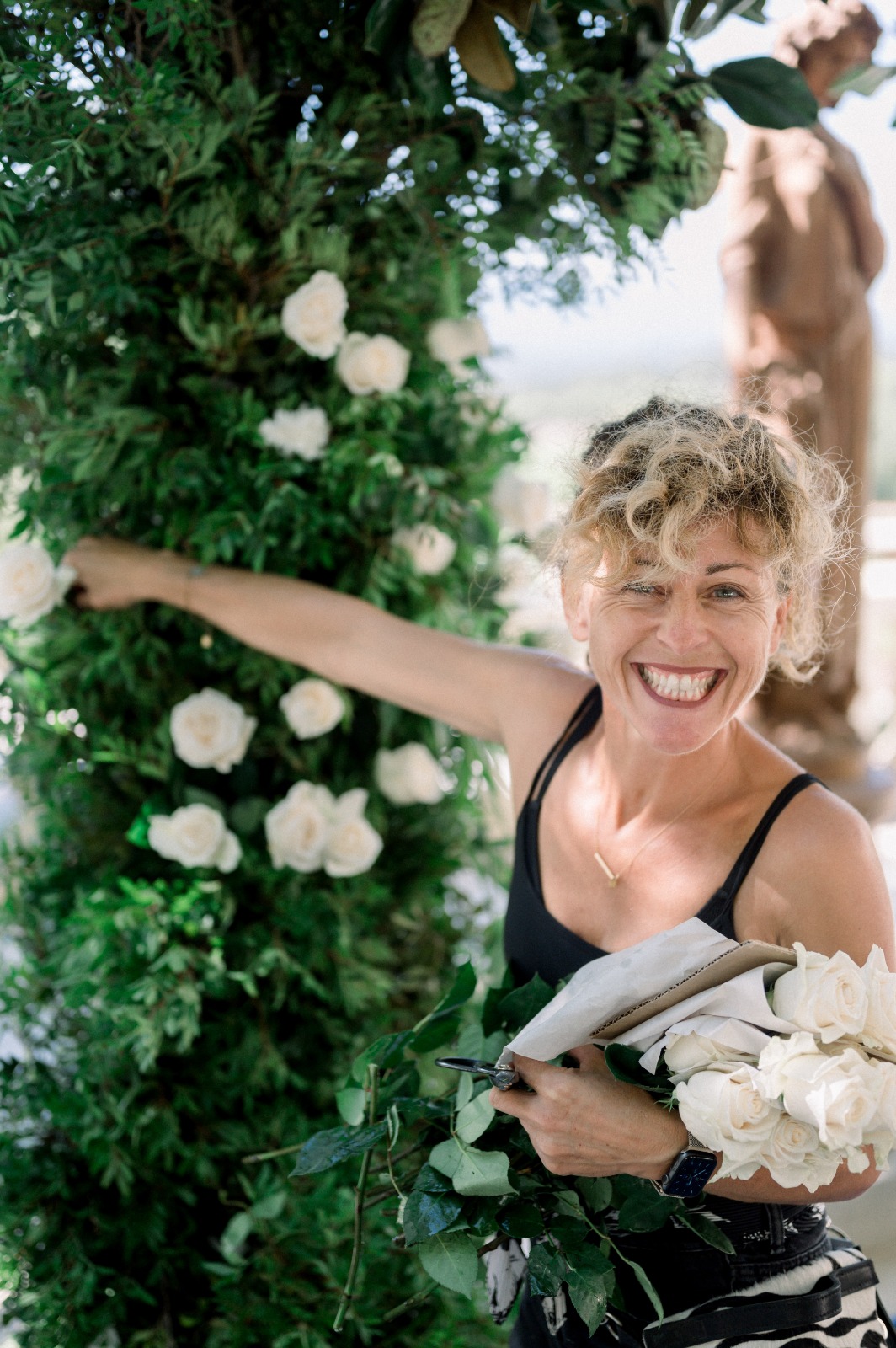
It was 2002, I was 28 and pregnant with my daughter Liz, and I loved this little flower store I'd called “A Fleur de Pot”. Eric Témim, a journalist for the M6 program Capital, called me and explained that he wanted to make a program about the underbelly of the florist's trade. Without hesitation, I said yes.
A team met me at 3.30 a.m. at the floral market, La Sica fleurs in Hyères. After a morning debriefing, they followed me every step of the way.
La Sica Marché is the essential platform for all florists in south-eastern France. It's a form of auction. Local growers drop off their flowers each morning, set a price and agree a price with the sellers. The sale starts at 5:00 am.
All florists and buyers are in position!
Buying is a real profession, and knowing how to select flower varieties and buy the right quantity is something you learn as you go along.
Once the sale was over, the M6 team followed me back to my store, filmed the setting up of the flowers in my store and finally the making of the different bouquets.
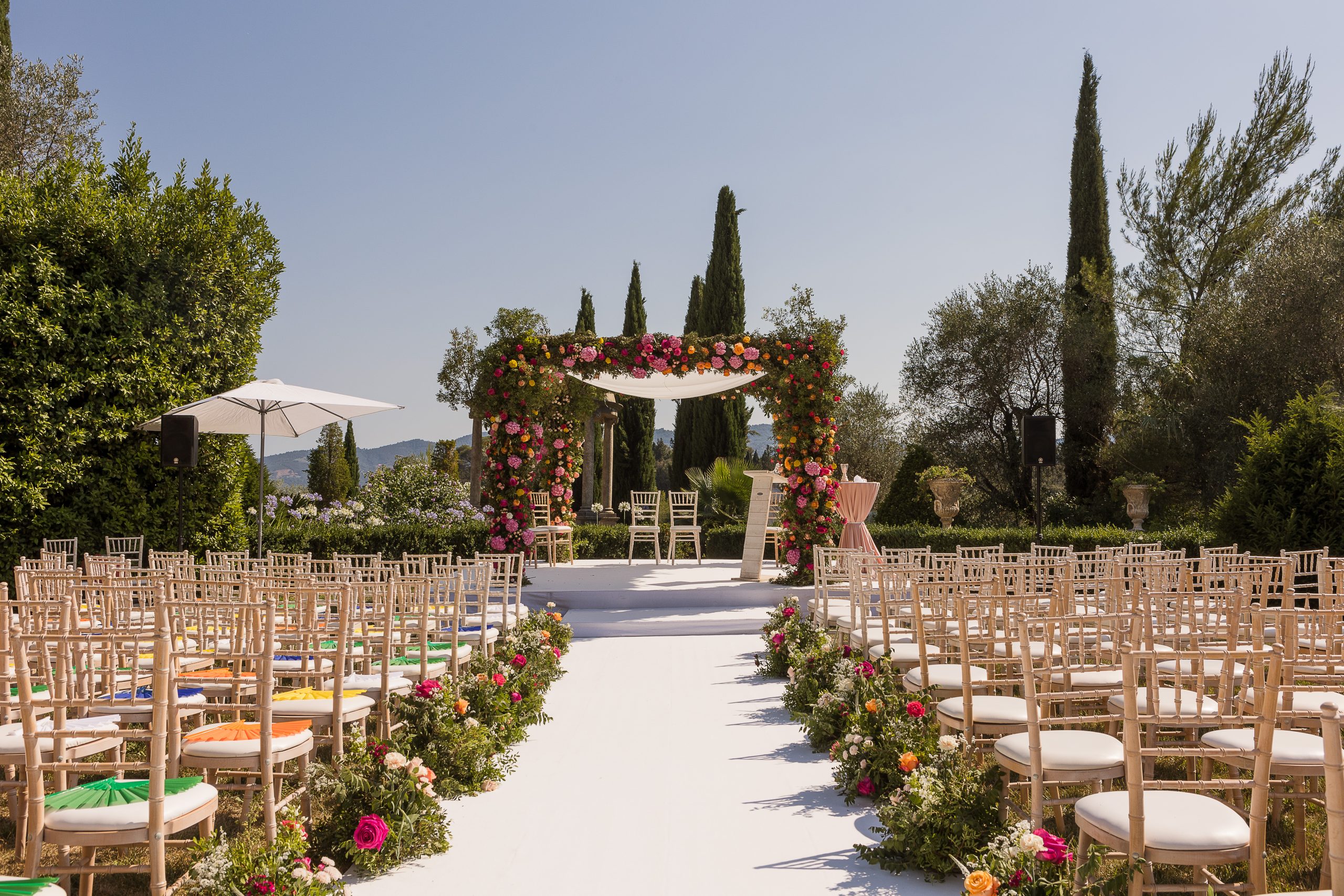
UNDER THE HOUPPA
Jewish marriage is much more than a union, it's a spiritual and family covenant deeply rooted in history.
The concept of the chuppah has its roots in the Hebrew Bible.
The word “chuppah” is not mentioned directly in biblical texts, but in the Middle Ages, the bride wore a veil to symbolically mark the union between them.
The choice of a chuppah, or “bridal canopy”, is an essential symbol for a Jewish wedding.
A chuppah signifies hospitality and welcome, with its 4 open sides illustrating the bride and groom's commitment to building a home based on love, kindness and openness to others.
The chuppah traditionally consists of 4 legs and a talith (prayer shawl) as a roof.
Flowers play an important role in Jewish ceremonies, symbolizing beauty, purity and blessing for the couple.
The ceremony usually begins with a blessing and the sharing of a cup of wine, called the Kiddush. Next, the bride and groom exchange rings, followed by the reading and presentation of the Ketubah, the marriage contract detailing the groom's commitments to his bride. Finally, the ceremony concludes with the Sheva Berakhot, the seven blessings pronounced in honor of the couple.
A very important symbolic moment at the end of the ceremony is the breaking of the glass, which occupies an essential place in the ritual.
This gesture, in which the groom crushes a glass under his foot, evokes an important historical connotation, recalling the destruction of the Second Temple in Jerusalem, even in a moment of great joy, to remember the suffering and loss of the Jewish people and the breaking of the past and the beginning of a new chapter.
After the ceremony, the bride and groom spend a moment of Yiboub seclusion, before joining the guests to symbolize their new life together.
So, through every gesture and every symbol, the Jewish wedding celebrates the sacred union of the bride and groom, marked by love, commitment and the memory of ancestral traditions.
THE BOUQUET OF THE VIRGIN IN PROENCE:
A TRADITION
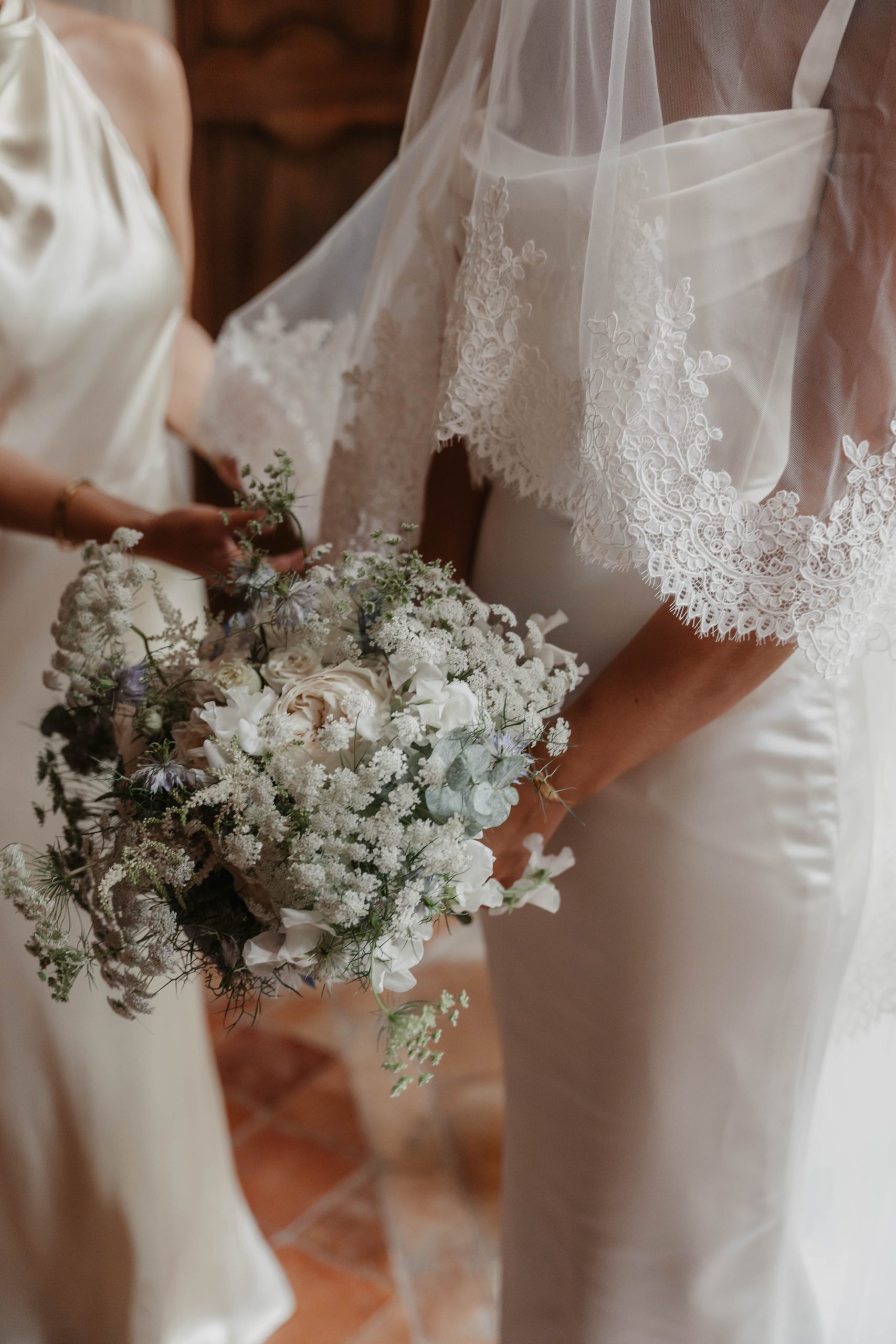
Provence is a region rich in tradition, with its ancient chapels and Romanesque churches evoking a deep attachment to religious customs.
Churches are often built of local stone, giving them a unique charm.
Provençal culture is steeped in spirituality, and weddings in particular are deeply rooted in tradition.
It's not just a union between two people, but a commitment blessed by God and placed under the protection of the Virgin Mary.
The Virgin Mary is the symbol of purity, love, protection and fertility.
The Provencal church, often adorned with a statue dedicated to the Virgin, is the sacred setting for this tribute.
For many Provencal families, the church is a place of remembrance. Weddings often take place in the same parish as those of previous generations, thus perpetuating a family and religious custom.
In Provence, it's traditional to offer a bouquet to the Virgin Mary during the religious ceremony on the wedding day.
The bouquet is traditionally made up of white flowers, symbolizing purity, love and devotion.
At the end of the ceremony, the bride places the bouquet at the feet of the statue.
This is not just a symbolic gesture, but a silent prayer for protection and blessing.
By offering this bouquet, she evokes her wish to found a family under the Virgin's benevolence, and also testifies to the bride and groom's gratitude and faith in her.
So, the bouquet de la Vierge in Provence is much more than just a ritual or tradition; it embodies the soul of the region.
The bridal bouquet
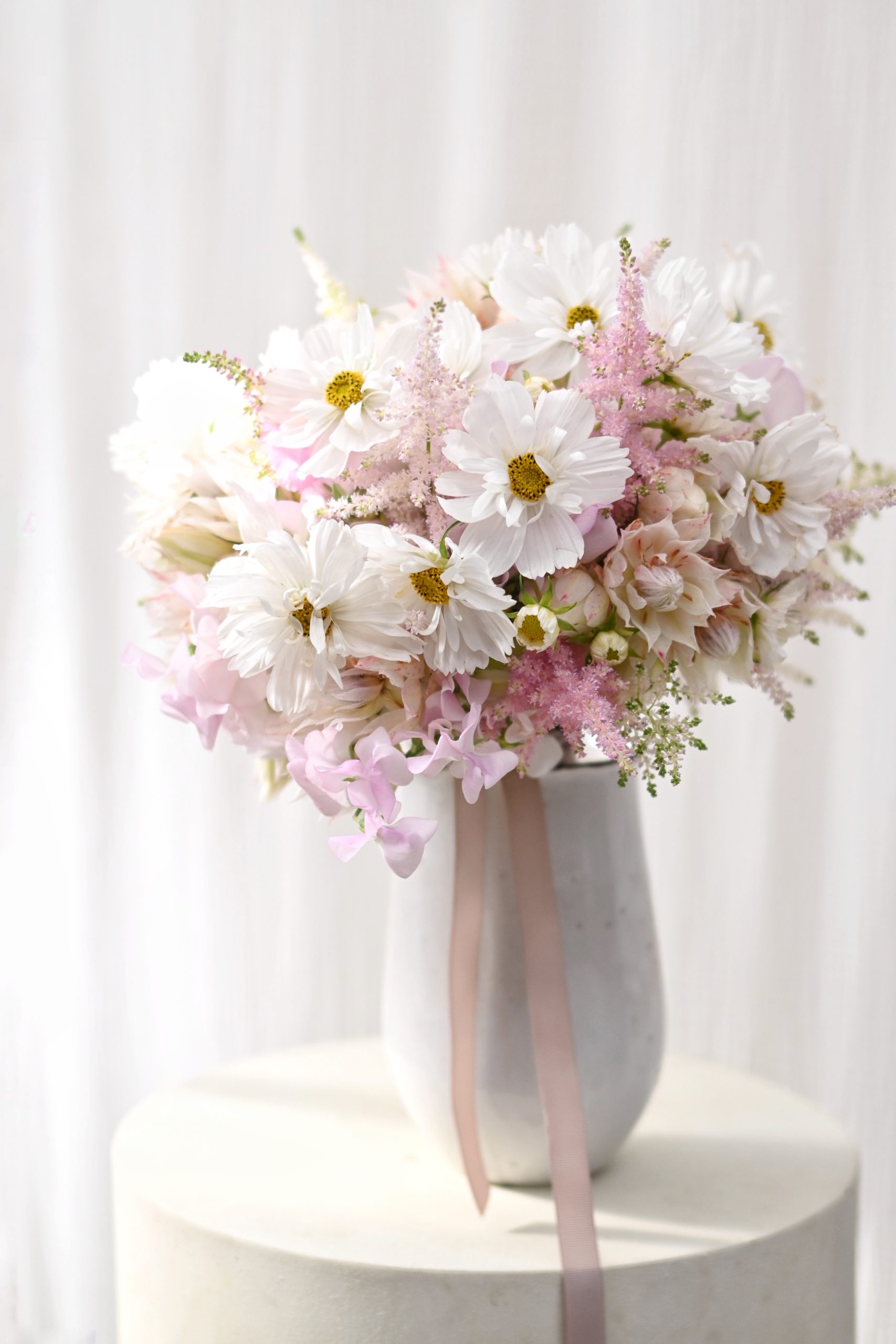
The history of the bridal bouquet dates back to ancient times, when young women adorned themselves with flowers to symbolize fertility and purity.
Today, the bridal bouquet is much more than a simple floral accessory.
Each flower has its own significance, and can express deep feelings or wishes for the future.
Each flower has a particular meaning. For example, the White Rose symbolizes purity and eternal love. The Peony is a sign of prosperity and good luck, while the Lily of the Valley evokes sweetness and harmony.
The color of the bouquet plays an essential role, as each hue carries a particular meaning depending on the wedding theme, the bride's personal preferences or the emotions she wishes to convey through her bouquet. The bride can choose according to her taste or the season of the flowers.
Her bridal bouquet must be in harmony with her dress, sublimating it as a jewel sublimates a woman. So her bouquet must sublimate her dress. The dress remains the main element.
The bouquet toss is one of the most eagerly awaited moments of the ceremony, a unique moment shared with loved ones. After exchanging her vows, the bride turns to her friends and tosses her bouquet into the crowd. According to tradition, whoever catches the bouquet will be the next to marry. This gesture allows the bride to share a moment of joy and complicity with her nearest and dearest.
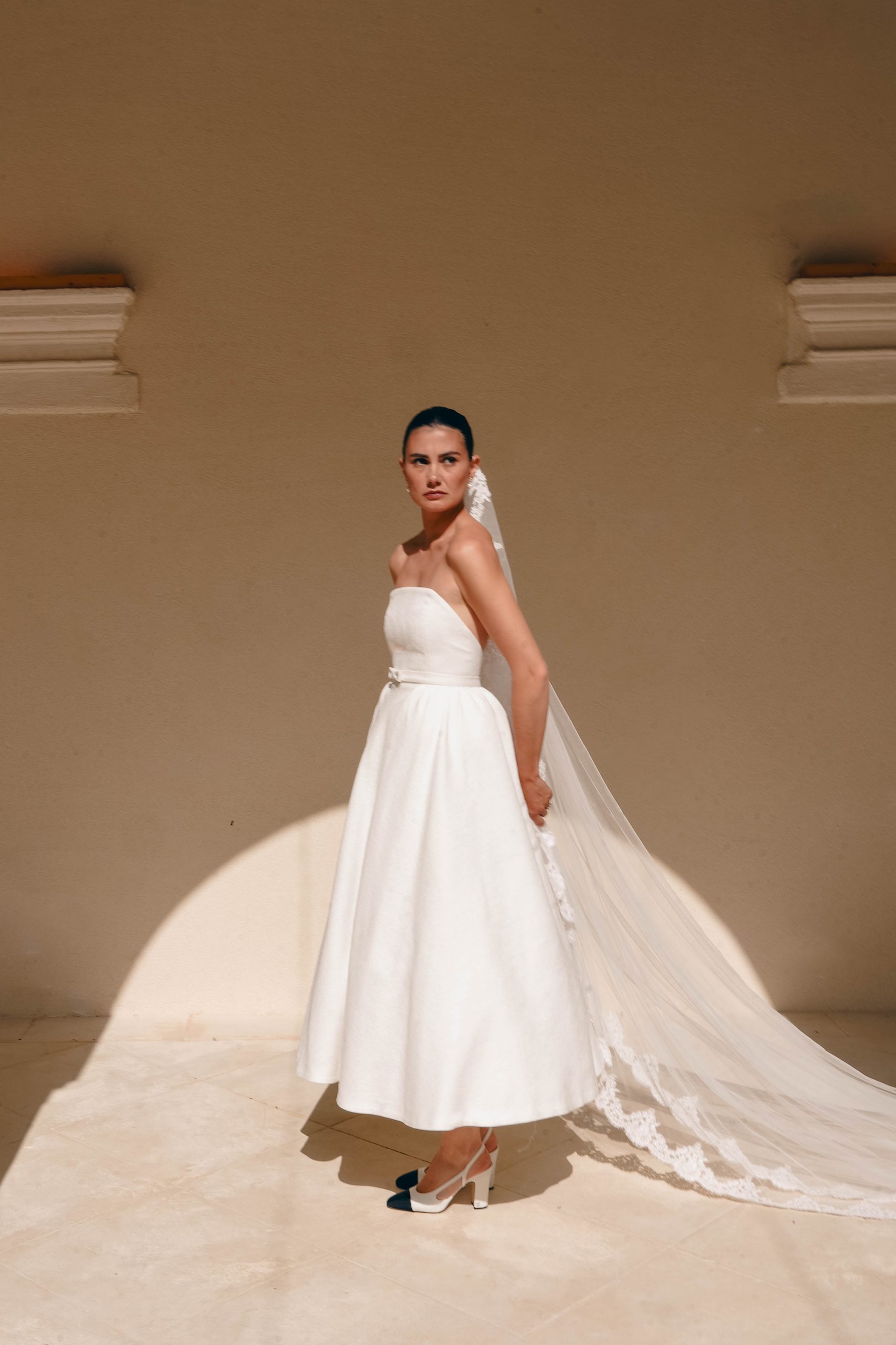
Emma & Clement
Emma and Clément chose to celebrate their union in a venue steeped in history and charm: the Couvent Royal in Saint-Maximin. With its stone walls, majestic vaults and serene cloister, this wedding exuded timeless elegance and simplicity.
Emma wore a minimalist dress with Chanel shoes, sublimated by a lace veil. In her hands was a bouquet of white peonies, sweet peas and cosmos. The bouquet was a perfect match for her sleek gown, creating a chic and refined ensemble.
On arrival, guests were greeted by a walkway lined with wispy gypsophila, dried foliage and a bamboo grove. The effect? An almost suspended, timeless atmosphere, where nature seemed to extend right through to the scenography. Surrounded by greenery and bathed in light, Emma joined Clément to say “I do” to the love of her life.
After the ceremony, the bride and groom and their guests enjoyed dinner under the stars in the stone cloister, lit up by garlands of lights. Each table was punctuated with soliflores and transparent vases, holding white flowers, lisianthus, carnations and a few ranunculus, arranged as if freshly picked from a garden, accompanied by candles for a soft, warm atmosphere.
For the rest of the evening, Emma opted for a short, sparkling dress with black polka dots, perfect for sharing the red fruit cake and dancing the night away.
This wedding is proof that a floral décor can transform a historic venue into a veritable cocoon of poetry, without ever distorting it. The flowers, chosen for their simplicity and elegance, created a fresh, pure and deeply romantic atmosphere, just like Emma and Clément.
TRENDY BOUQUET 2025
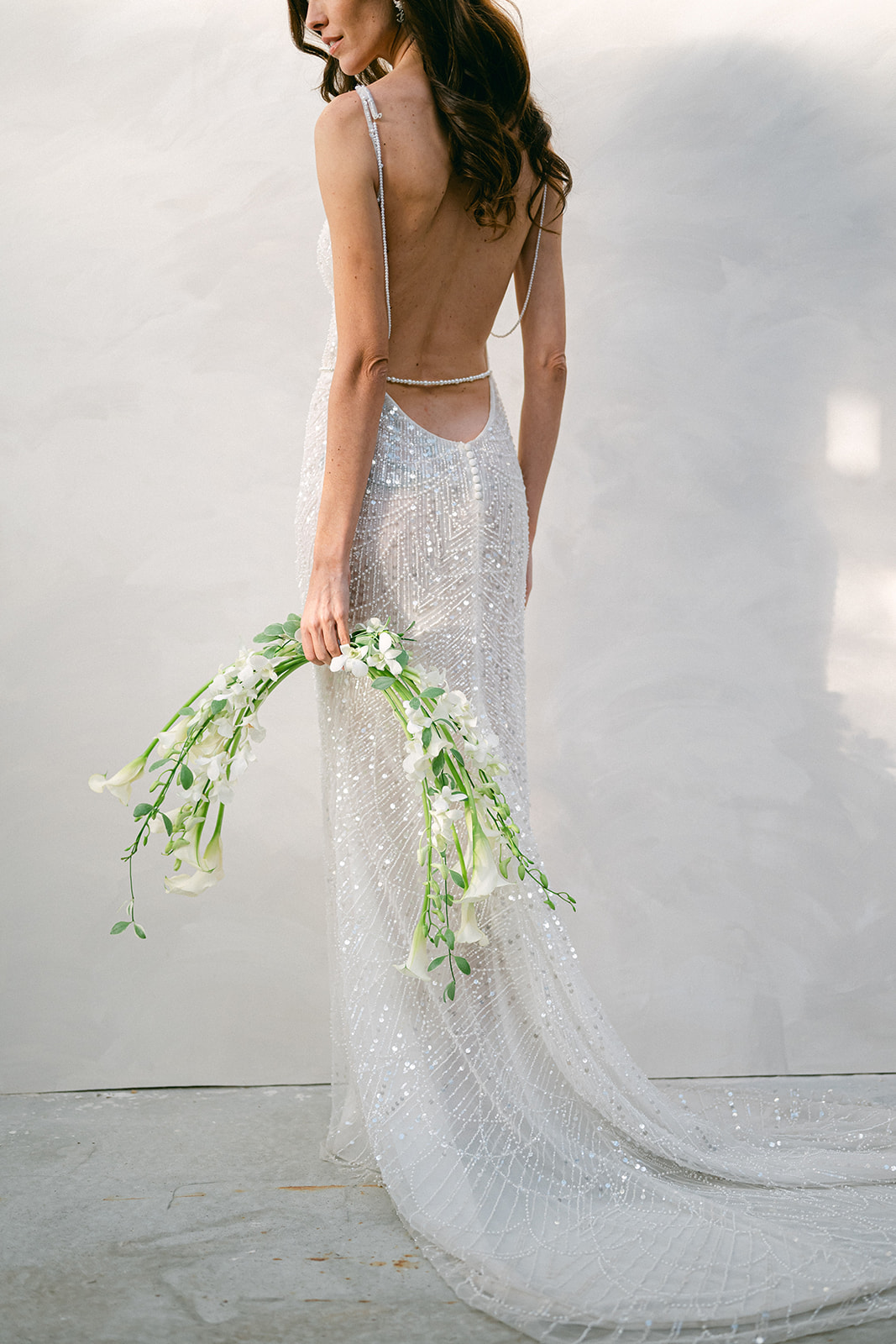
In 2025, the bridal bouquet will be a centrepiece in its own right. It will no longer simply accompany the dress: it will complement it, reveal it, and affirm the bride's personality. With bold shapes, sculptural flowers, minimalist lines and natural elegance, the bouquet becomes a true contemporary floral creation, reflecting high-end floral art.
Three floral inspirations to enhance the modern bride:
- A minimalist bouquet in the shape of an inverted arch, composed of white calla lilies, dendrobium orchids and supple ruscus. Light, graphic and unexpected, it structures the silhouette with modernity. Perfect for a contemporary wedding with a sleek and bold style.
- A spectacular composition worn on the back like a floral jewel. Callas, white orchids and cream dahlias come together in an elegant floral cascade, evoking a modern train. Ideal for a trendy, bold bride looking for a couture bouquet.
-A reinvented bouquet with the look of a natural garden. Cream dahlias, yellow tulips, green snapdragons and oncidium orchids come together in a soft and luminous palette. A creation full of tenderness, freshness and floral romanticism.
In 2025, the bridal bouquet will be much more than an accessory: it will be a statement of style. Free, elegant, avant-garde and deeply connected to nature, it will play with vertical shapes, airy lines, plant textures and natural hues.
Wedding bouquets in 2025 stand out for their ability to combine floral creativity, modern design and botanical poetry. A true floral trend that serves to enhance the bride's emotions and identity.
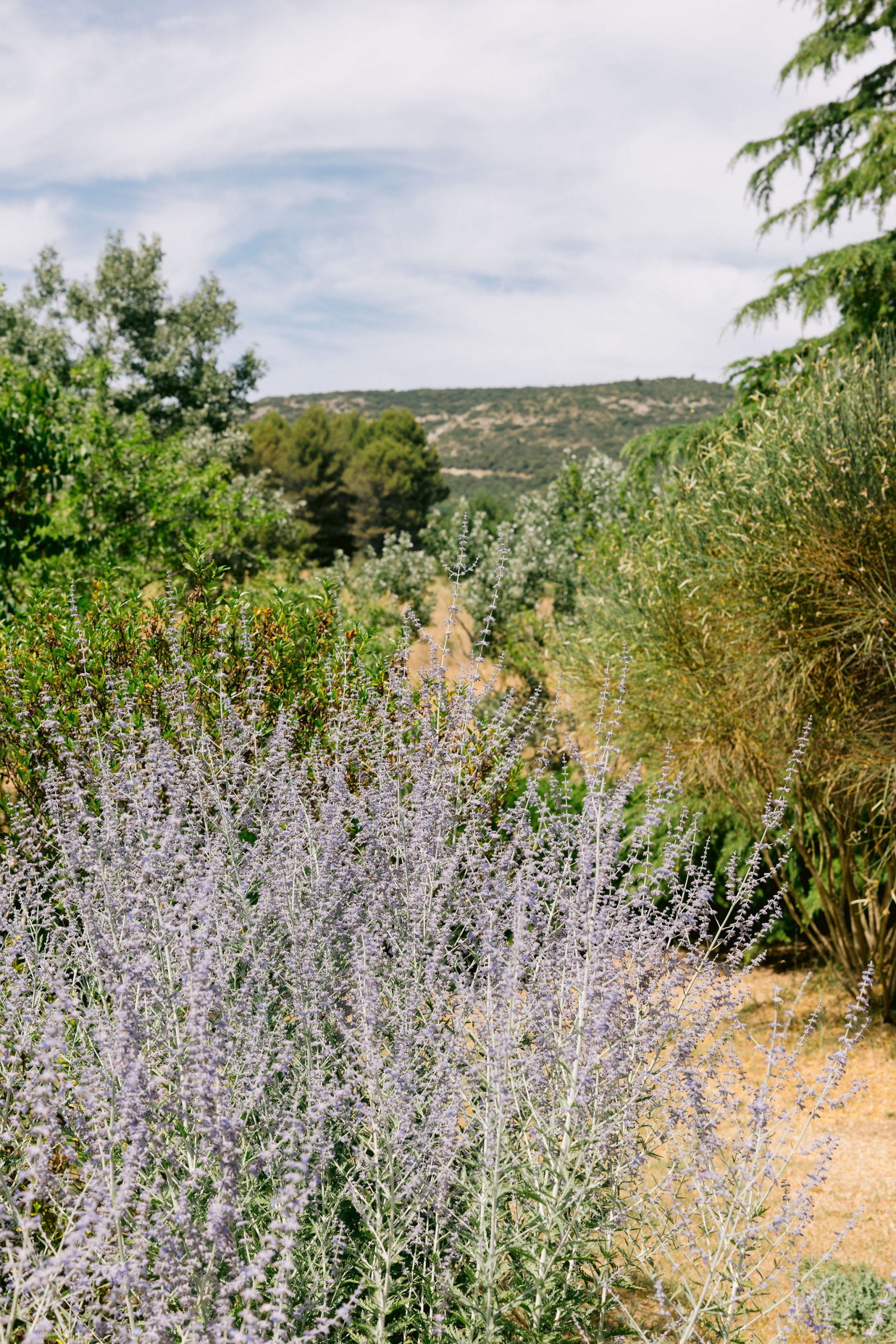
WEDDING IN PROVENCE
Provence... the very word evokes the song of cicadas, the scent of fresh lavender, the golden light of the South of France and the pale stones of ancient bastides. This iconic region attracts couples from all over the world looking for an authentic and refined wedding. Each season reveals a unique setting, always bathed in natural light and an atmosphere imbued with poetry.
Here, nature is an inexhaustible source of inspiration. Centuries-old olive trees, slender cypresses, fields of lavender in bloom, spring almond trees and the ochre earth typical of the South all come together to create the perfect backdrop. In Provence, there is no need for artifice: the landscape becomes a decorative element in its own right, a natural setting for celebrating love with sensitivity and elegance.
Provençal weddings adopt a palette of soft, sunny colours inspired by the surrounding nature: off-white, lavender, powder pink, sage green, terracotta, sand beige... These timeless shades blend harmoniously into the decor to enhance the discreet elegance of each moment.
In Provence, the art of hospitality takes on its full meaning: long, convivial tables, set under hundred-year-old plane trees or illuminated by guinguette garlands, create a warm and authentic atmosphere. Weddings become simple yet soulful celebrations, where love is celebrated with joy, sharing and natural beauty.
Because here, elegance is experienced in simplicity.
It's not about going big, it's about getting it right. Provence inspires natural, sincere and vibrant floral decorations. A soft, organic atmosphere, always connected to the elements — where every detail exudes light, texture and emotion.
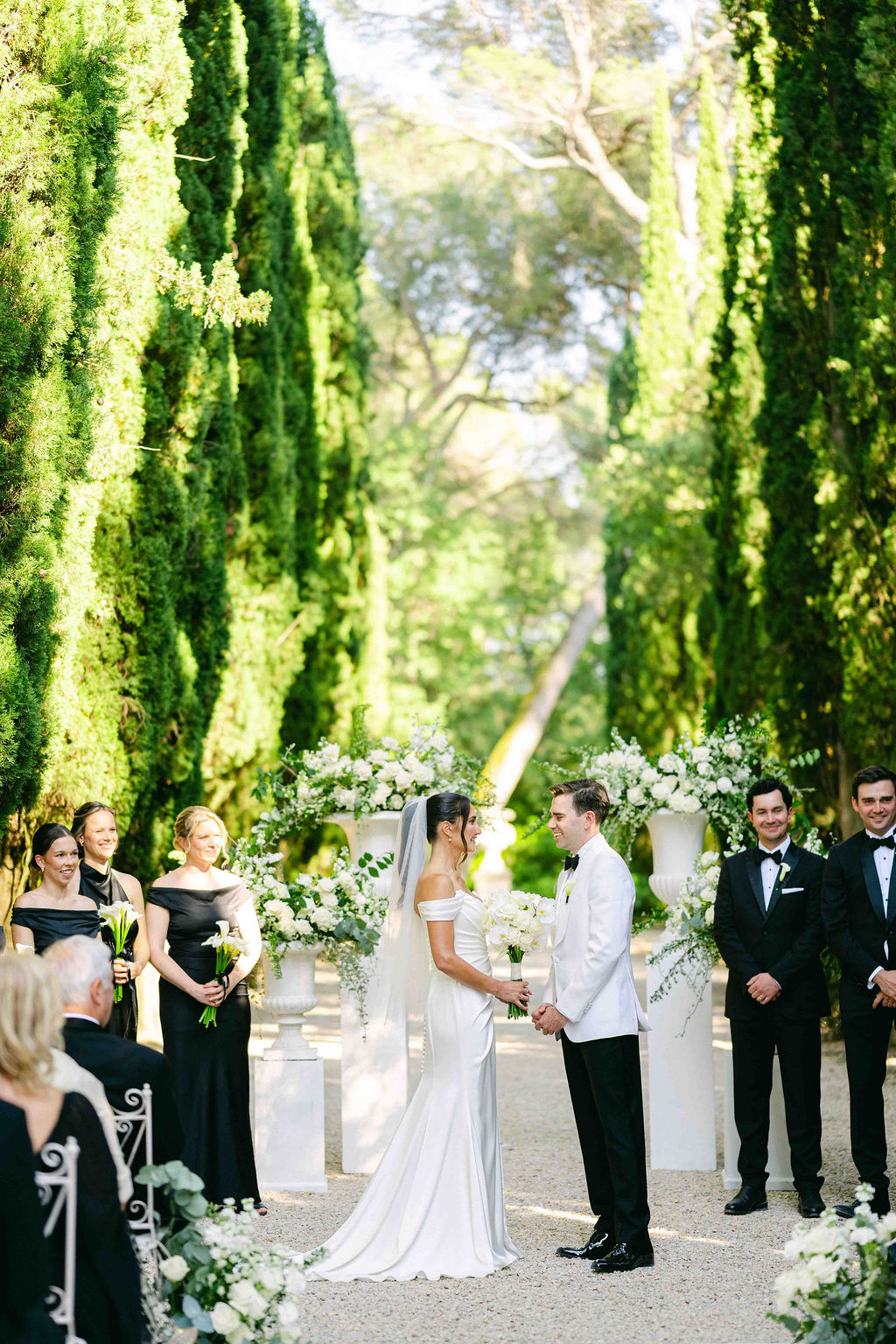
black and white wedding
Forget the idea that black is forbidden at weddings.
Black and white weddings have become one of the biggest trends in recent years.
Today, black is the colour that makes all the difference. Far from being sombre, it creates a chic, modern and highly sophisticated atmosphere.
The colour black adds a touch of mystery, luxury and elegance, creating a striking contrast that catches the eye.
A black and white wedding party is guaranteed to wow your guests.
Bridesmaids in elegant black dresses, a groom in a contrasting tuxedo, a bride radiant in white: the result is harmonious and sublime.
Black does not make the light disappear; on the contrary, it enhances the purity of white.
From the castle to the table, everything becomes a film set. Black and white transform every detail into an elegant scene: refined stationery with wax seals, black ribbons on white napkins, candles and glassware that capture the light. The whole ensemble exudes discreet luxury and attention to detail.
A black and white wedding is not just a trend, it is a true statement of style. It combines classic elegance with bold modernity to create a unique and refined celebration.
Daring to wear black is a way of asserting your personality, making a lasting impression and transforming your wedding into a timeless, chic and unforgettable memory.
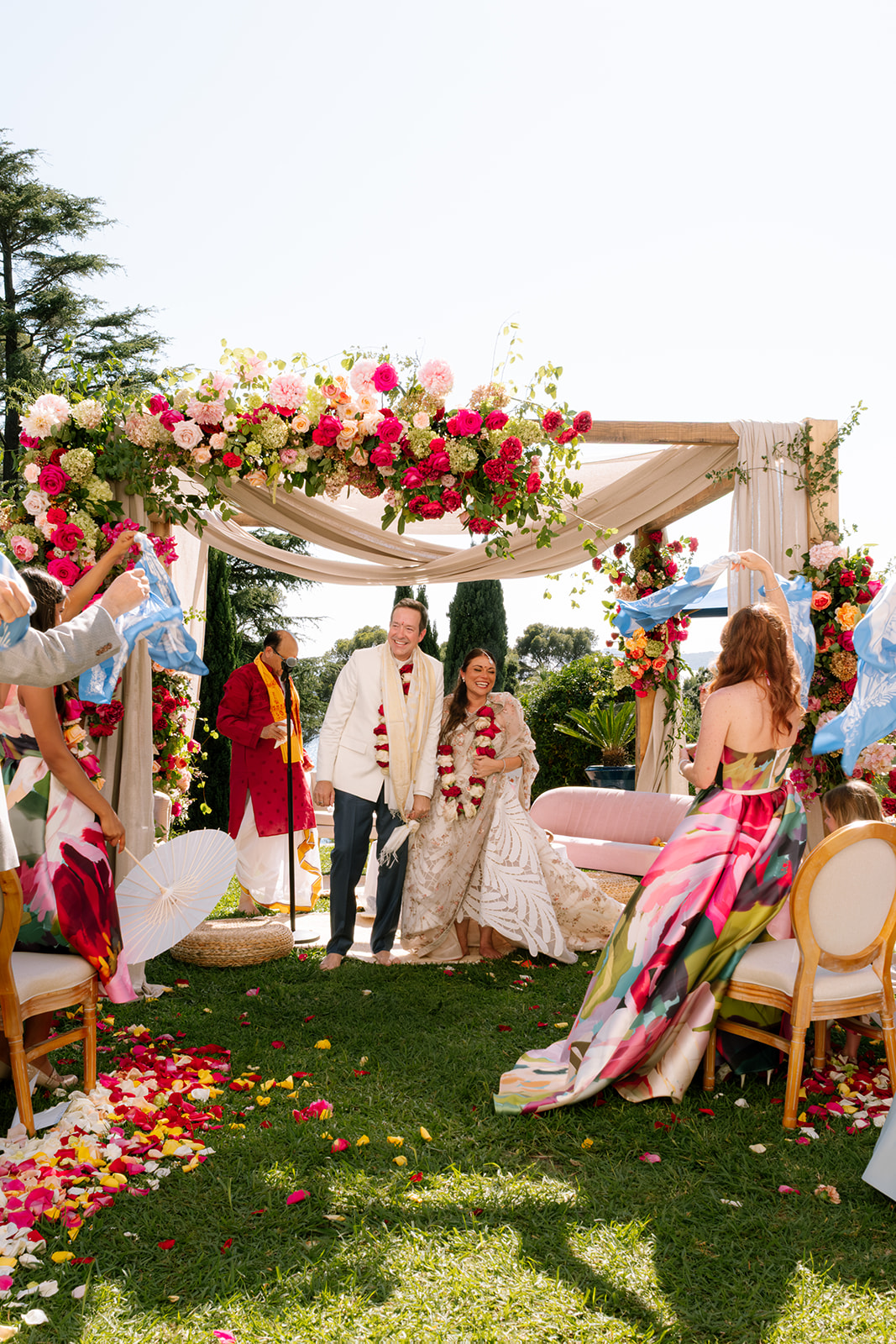
Indian wedding
Indian weddings are unique celebrations, renowned for their rich traditions, diverse rituals and the great importance placed on decoration, particularly floral wedding decorations. Usually lasting several days, they include various ceremonies such as Mehndi, Haldi, Sangeet, the wedding ceremony itself and the reception. Each of these highlights has its own codes and requires a specific atmosphere, making Indian weddings a comprehensive event that requires precise organisation and overall decorative planning.
The wedding ceremony takes place under a mandap, the central element of Indian weddings and the focal point of the scenography. The mandap is traditionally decorated with fresh flowers, foliage and fabrics, creating a space that is both symbolic and visually striking. The choice of flowers, volumes, heights and colours plays an essential role in the harmony of the whole and in the overall atmosphere of the wedding. The decoration of the mandap is often one of the most striking elements of an Indian wedding.
Flowers play a central role throughout Indian weddings. They are present at every stage of the celebration, notably in the Indian wedding floral garlands (varmala) exchanged by the bride and groom, the decoration of the mandap, the flower-lined aisles, the centrepieces and the decoration of the reception areas. The most commonly used varieties are jasmine, rose, marigold and carnation, flowers prized for their symbolism, durability and strong visual impact. Floral decorations thus become a structuring element of Indian weddings, contributing fully to the identity of the event.
Traditionally, Indian wedding decoration favours intense, warm colours such as red, orange, fuchsia and gold, combined with an abundance of flowers. Today, trends are changing and many couples are opting for more contemporary settings, with softer colour palettes such as ivory, nude, terracotta, powder pink and natural greens. This evolution allows for the creation of elegant, modern and personalised decorations, while respecting the spirit and codes of Indian weddings.Creating floral decorations for an Indian wedding requires specific expertise, particularly due to the length of the event, the number of ceremonies and the large quantities of flowers involved. Aesthetic consistency between the different stages of the wedding, adaptation to the reception venue and respect for traditions are essential elements in ensuring a harmonious result. The diversity of cultures and customs across India's regions offers great creative freedom and allows for the design of unique decorations tailored to each couple and each wedding project.

